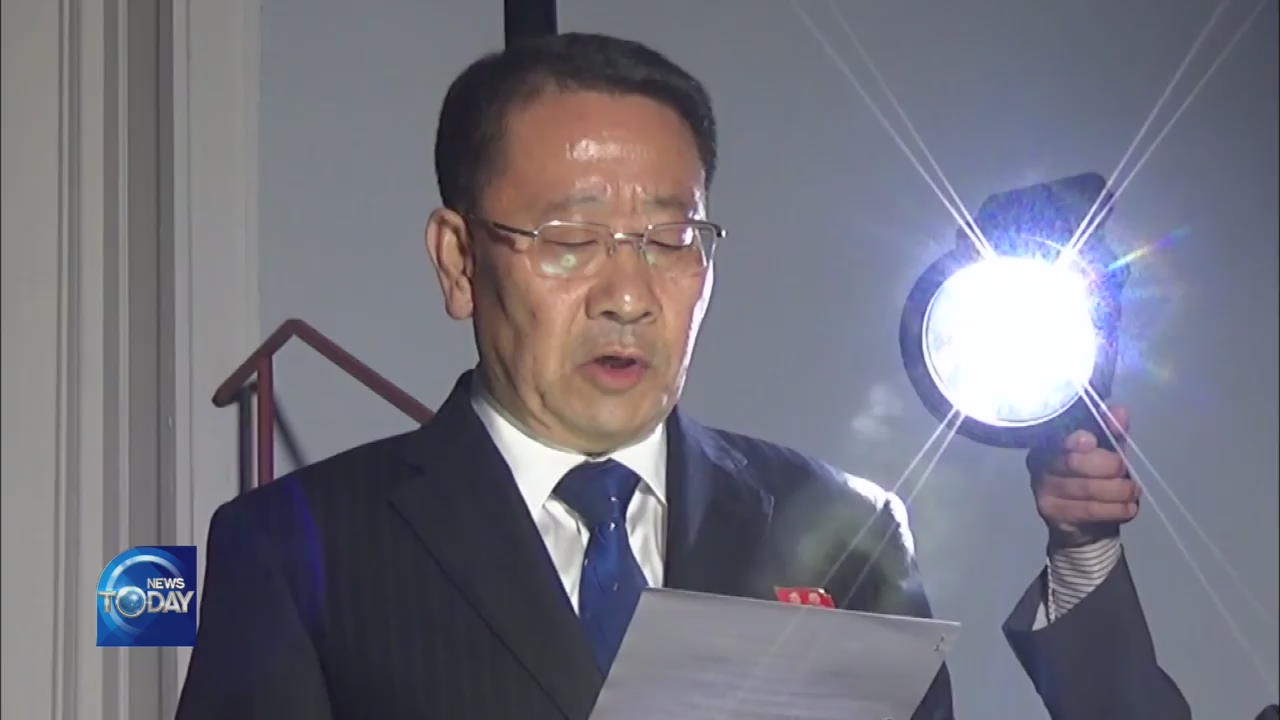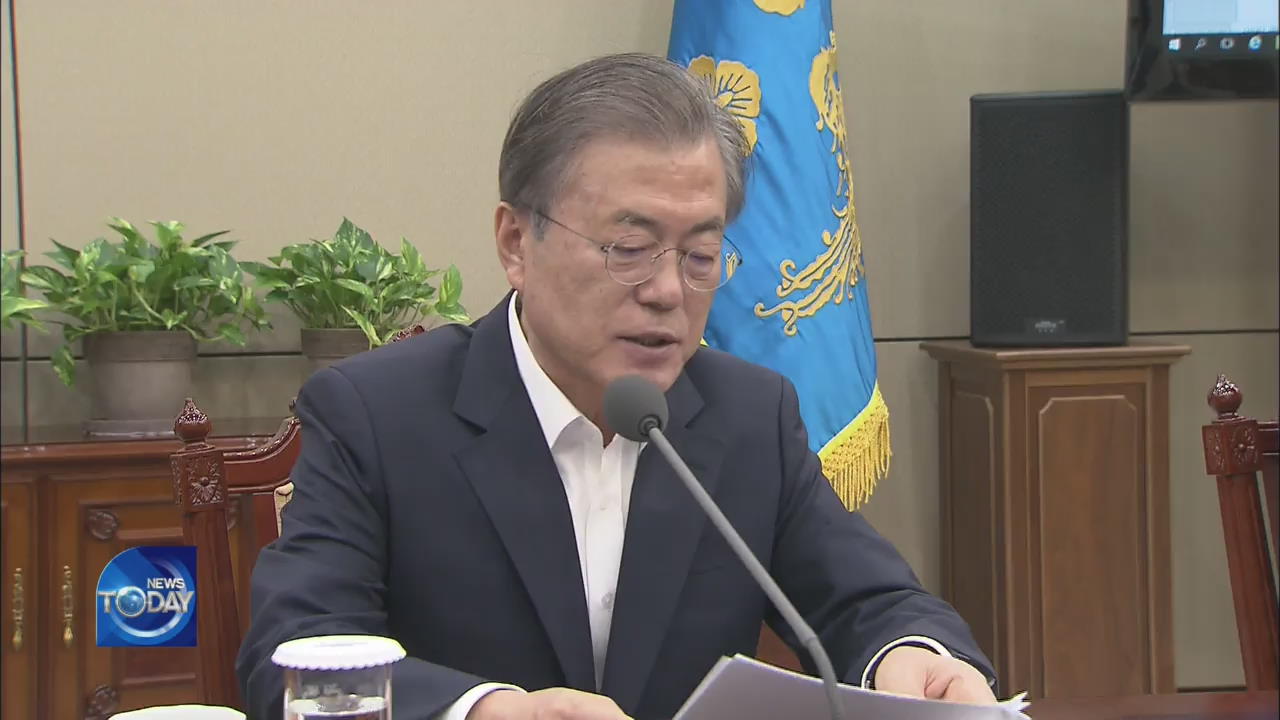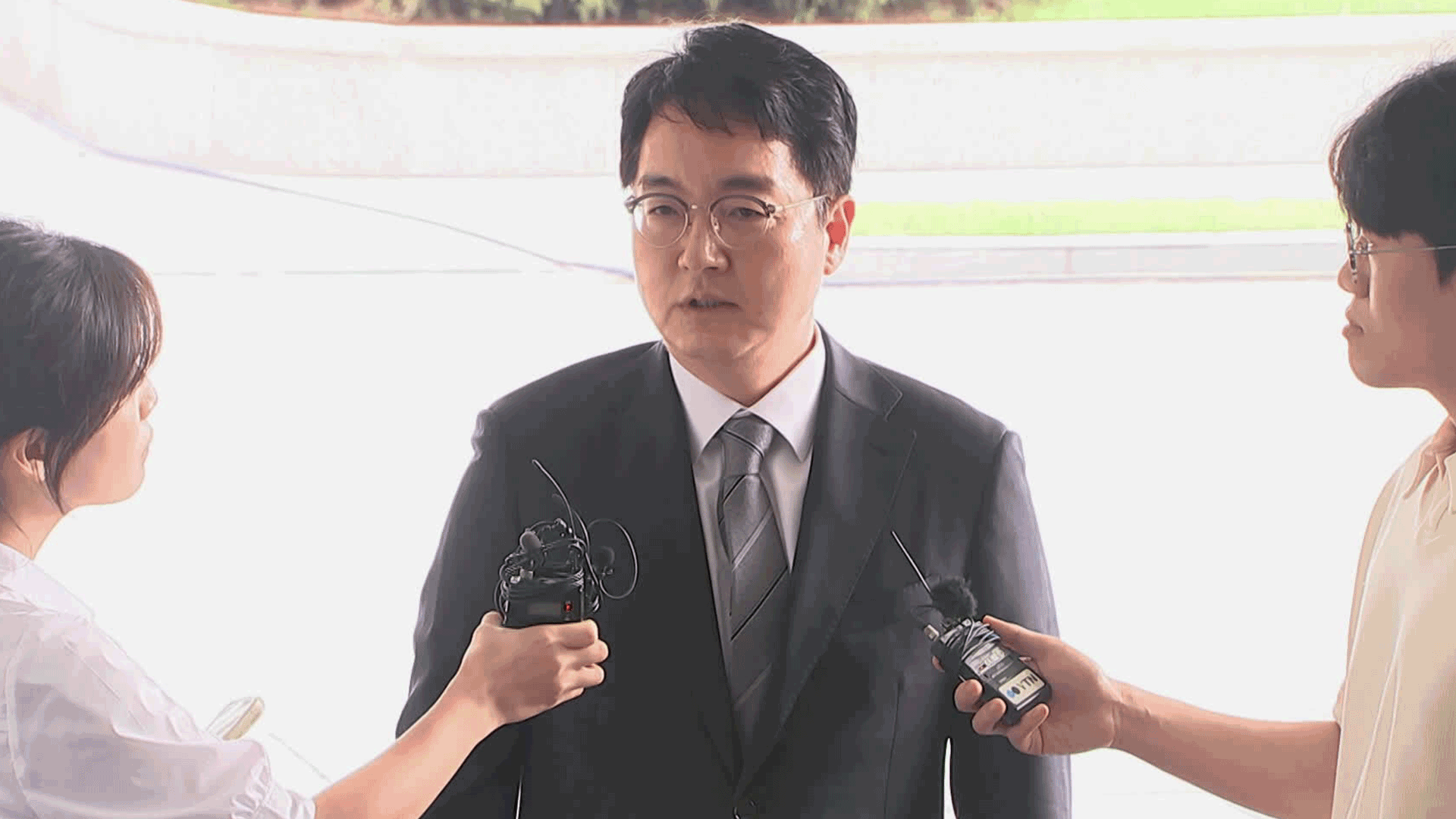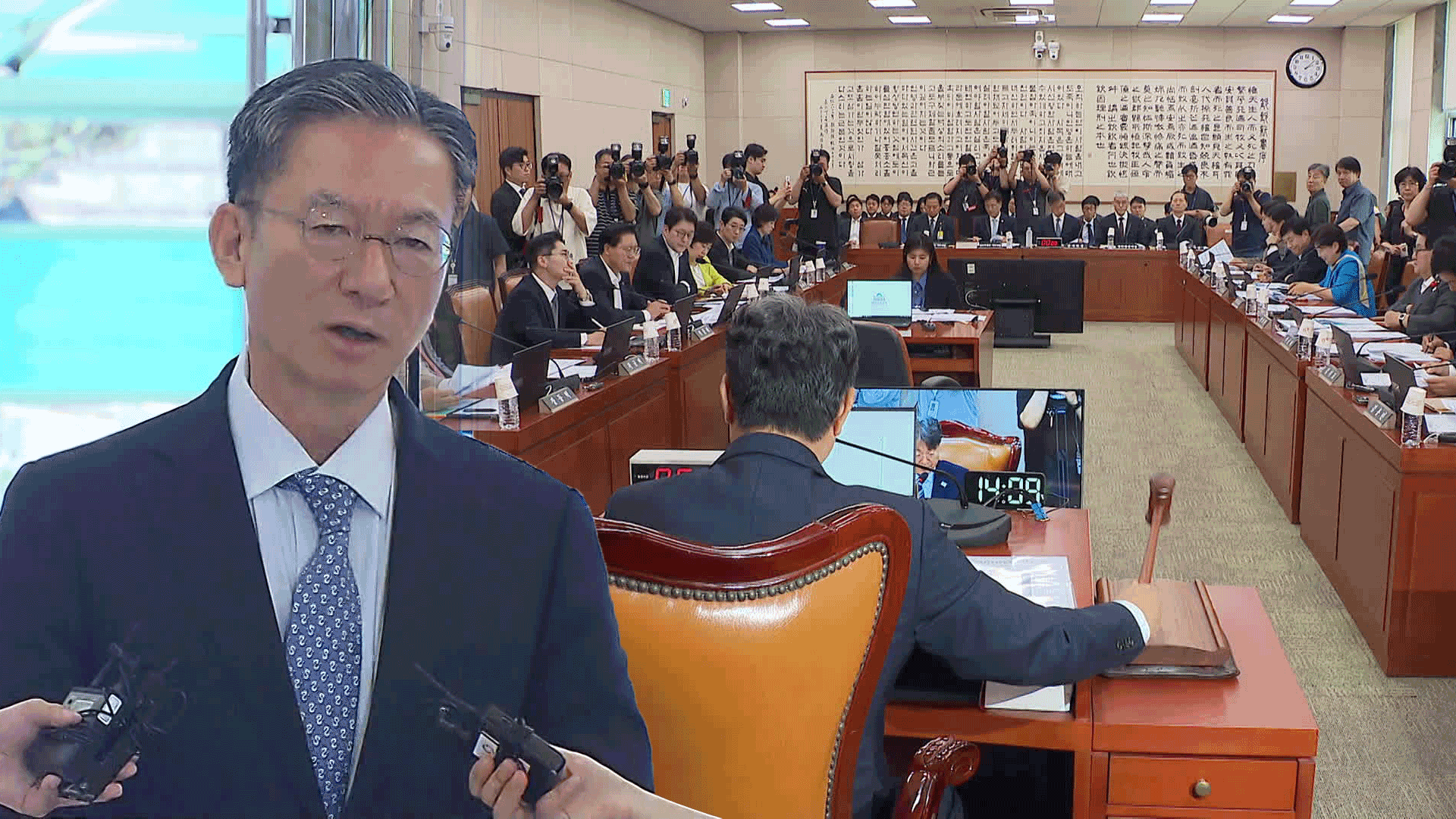N. KOREA'S STANCE ON TALKS WITH U.S.
입력 2019.10.08 (15:01)
수정 2019.10.08 (16:44)
읽어주기 기능은 크롬기반의
브라우저에서만 사용하실 수 있습니다.
[Anchor Lead]
North Korea's chief nuclear negotiator has returned to Pyongyang, after declaring the breakdown of working-level talks with the U.S. in Stockholm on Saturday. Ever since, North Korea has been pressuring Washington by publicly saying that further progress depends on how the U.S. acts. Next up, we'll take a closer look at the regime's true intentions.
[Pkg]
North Korea's top nuclear negotiator with the U.S. repeatedly said in Sweden that it is up to Washington to keep talks alive.
[Soundbite] KIM MYONG-GIL(NORTH KOREA'S TOP NEGOTIATOR) : "Ask the U.S. We think the recent talks are very sickening."
Kim Myong-gil remained skeptical about resuming talks in two weeks time - a proposal made by Sweden and accepted by the U.S.
[Soundbite] KIM MYONG-GIL(NORTH KOREA'S TOP NEGOTIATOR) : "Do you expect the U.S. to devise a new proposal in two weeks, when it has failed to do so for nearly 100 days following the summit at Panmunjom?"
Kim's remarks indicate that America's new proposals, which Washington has described as creative, fell short of Pyongyang's expectations.
[Soundbite] KIM MYONG-GIL(NORTH KOREA'S TOP NEGOTIATOR) : "If the U.S. is not well prepared, who knows what terrible incident could happen."
However, experts in China believe that the North will unlikely walk away from the negotiating table completely. Some analysts believe North Korea's declaration of a collapse in the Stockholm talks is a political and diplomatic strategy to win more concessions from the U.S. Others say the regime is desperate to wrap up the negotiations before the end of the year. Therefore, it will be very burdensome for Pyongyang, both internally and externally, to choose a new path of returning to a head-on confrontation with Washington. The North's declaration of a break down in talks is being interpreted as a move to calculate the situation and gain the upper hand in future negotiations. Many observers believe that the two sides can resume talks in the near future, if not in two weeks.
North Korea's chief nuclear negotiator has returned to Pyongyang, after declaring the breakdown of working-level talks with the U.S. in Stockholm on Saturday. Ever since, North Korea has been pressuring Washington by publicly saying that further progress depends on how the U.S. acts. Next up, we'll take a closer look at the regime's true intentions.
[Pkg]
North Korea's top nuclear negotiator with the U.S. repeatedly said in Sweden that it is up to Washington to keep talks alive.
[Soundbite] KIM MYONG-GIL(NORTH KOREA'S TOP NEGOTIATOR) : "Ask the U.S. We think the recent talks are very sickening."
Kim Myong-gil remained skeptical about resuming talks in two weeks time - a proposal made by Sweden and accepted by the U.S.
[Soundbite] KIM MYONG-GIL(NORTH KOREA'S TOP NEGOTIATOR) : "Do you expect the U.S. to devise a new proposal in two weeks, when it has failed to do so for nearly 100 days following the summit at Panmunjom?"
Kim's remarks indicate that America's new proposals, which Washington has described as creative, fell short of Pyongyang's expectations.
[Soundbite] KIM MYONG-GIL(NORTH KOREA'S TOP NEGOTIATOR) : "If the U.S. is not well prepared, who knows what terrible incident could happen."
However, experts in China believe that the North will unlikely walk away from the negotiating table completely. Some analysts believe North Korea's declaration of a collapse in the Stockholm talks is a political and diplomatic strategy to win more concessions from the U.S. Others say the regime is desperate to wrap up the negotiations before the end of the year. Therefore, it will be very burdensome for Pyongyang, both internally and externally, to choose a new path of returning to a head-on confrontation with Washington. The North's declaration of a break down in talks is being interpreted as a move to calculate the situation and gain the upper hand in future negotiations. Many observers believe that the two sides can resume talks in the near future, if not in two weeks.
■ 제보하기
▷ 카카오톡 : 'KBS제보' 검색, 채널 추가
▷ 전화 : 02-781-1234, 4444
▷ 이메일 : kbs1234@kbs.co.kr
▷ 유튜브, 네이버, 카카오에서도 KBS뉴스를 구독해주세요!
- N. KOREA'S STANCE ON TALKS WITH U.S.
-
- 입력 2019-10-08 15:09:12
- 수정2019-10-08 16:44:38

[Anchor Lead]
North Korea's chief nuclear negotiator has returned to Pyongyang, after declaring the breakdown of working-level talks with the U.S. in Stockholm on Saturday. Ever since, North Korea has been pressuring Washington by publicly saying that further progress depends on how the U.S. acts. Next up, we'll take a closer look at the regime's true intentions.
[Pkg]
North Korea's top nuclear negotiator with the U.S. repeatedly said in Sweden that it is up to Washington to keep talks alive.
[Soundbite] KIM MYONG-GIL(NORTH KOREA'S TOP NEGOTIATOR) : "Ask the U.S. We think the recent talks are very sickening."
Kim Myong-gil remained skeptical about resuming talks in two weeks time - a proposal made by Sweden and accepted by the U.S.
[Soundbite] KIM MYONG-GIL(NORTH KOREA'S TOP NEGOTIATOR) : "Do you expect the U.S. to devise a new proposal in two weeks, when it has failed to do so for nearly 100 days following the summit at Panmunjom?"
Kim's remarks indicate that America's new proposals, which Washington has described as creative, fell short of Pyongyang's expectations.
[Soundbite] KIM MYONG-GIL(NORTH KOREA'S TOP NEGOTIATOR) : "If the U.S. is not well prepared, who knows what terrible incident could happen."
However, experts in China believe that the North will unlikely walk away from the negotiating table completely. Some analysts believe North Korea's declaration of a collapse in the Stockholm talks is a political and diplomatic strategy to win more concessions from the U.S. Others say the regime is desperate to wrap up the negotiations before the end of the year. Therefore, it will be very burdensome for Pyongyang, both internally and externally, to choose a new path of returning to a head-on confrontation with Washington. The North's declaration of a break down in talks is being interpreted as a move to calculate the situation and gain the upper hand in future negotiations. Many observers believe that the two sides can resume talks in the near future, if not in two weeks.
North Korea's chief nuclear negotiator has returned to Pyongyang, after declaring the breakdown of working-level talks with the U.S. in Stockholm on Saturday. Ever since, North Korea has been pressuring Washington by publicly saying that further progress depends on how the U.S. acts. Next up, we'll take a closer look at the regime's true intentions.
[Pkg]
North Korea's top nuclear negotiator with the U.S. repeatedly said in Sweden that it is up to Washington to keep talks alive.
[Soundbite] KIM MYONG-GIL(NORTH KOREA'S TOP NEGOTIATOR) : "Ask the U.S. We think the recent talks are very sickening."
Kim Myong-gil remained skeptical about resuming talks in two weeks time - a proposal made by Sweden and accepted by the U.S.
[Soundbite] KIM MYONG-GIL(NORTH KOREA'S TOP NEGOTIATOR) : "Do you expect the U.S. to devise a new proposal in two weeks, when it has failed to do so for nearly 100 days following the summit at Panmunjom?"
Kim's remarks indicate that America's new proposals, which Washington has described as creative, fell short of Pyongyang's expectations.
[Soundbite] KIM MYONG-GIL(NORTH KOREA'S TOP NEGOTIATOR) : "If the U.S. is not well prepared, who knows what terrible incident could happen."
However, experts in China believe that the North will unlikely walk away from the negotiating table completely. Some analysts believe North Korea's declaration of a collapse in the Stockholm talks is a political and diplomatic strategy to win more concessions from the U.S. Others say the regime is desperate to wrap up the negotiations before the end of the year. Therefore, it will be very burdensome for Pyongyang, both internally and externally, to choose a new path of returning to a head-on confrontation with Washington. The North's declaration of a break down in talks is being interpreted as a move to calculate the situation and gain the upper hand in future negotiations. Many observers believe that the two sides can resume talks in the near future, if not in two weeks.
이 기사가 좋으셨다면
-
좋아요
0
-
응원해요
0
-
후속 원해요
0














![[단독] 골프연습장 아니라더니<br>…‘한남동 골프연습장’ 도면 입수](/data/news/2025/07/01/20250701_Uh8Jnu.png)


이 기사에 대한 의견을 남겨주세요.